- Home
- Kate Quinn
Ribbons of Scarlet Page 4
Ribbons of Scarlet Read online
Page 4
A servant came with tea, and Condorcet eyed an easel upon which my latest sketch of the executed man remained unfinished. “That’s very vivid. Is it yours?”
“Yes,” I admitted. “But despite all my attempts, it doesn’t capture the human suffering . . .”
“Because torture consists of more than what we can see. There are smells and sounds and—”
“Pain,” I said, swallowing, feeling it anew beneath my breastbone. “Just to witness it.”
He nodded. “I feel that when I hear about the slave markets too.”
“I’d like to end torture and slavery,” I said, realizing how grandiose such a statement sounded. Perhaps I should bring an end to smallpox while I was at it, or give men wings and women the right to become jurists. “I might as well wish for the moon, I know—”
“Why not reach for the moon, however out of reach it seems? Torture and slavery have no place in a civilized world.”
I felt the familiar pleasure of intellectual camaraderie—the delight of my opinions being echoed. Of an impulse, I touched his arm. “I think, sir, we shall be good friends.”
“Because we agree?”
“Surely that helps.”
Condorcet blew upon his cup. “I suspect true respect is formed when you find something upon which you disagree and yet remain on good terms.”
“Unfortunately, I agree with that too. So how will we test the theory?”
“We’ll have to find something upon which to disagree.”
We made a game of it, discussing, rapid-fire, social and religious subjects, searching for something upon which our opinions differed, and finding nothing. Finally, he asked, “And how do your thoughts run on the matter of marriage?”
I set down my teacup, hoping to vex him. “I believe marriage ought to be abolished.”
“Abolished?” Condorcet cleared his throat in apparent shock.
I nearly laughed at having turned the tables. “The church holds marriage is a sacred covenant between a man, a woman, and a god who doesn’t exist, for the purpose of children being brought forth advantageously. And yet the church permits—nay, encourages—fathers to sell their daughters into marriage whilst they are still children, delivering them unto the tyranny of their husbands in an arrangement that can never be undone.”
“Regrettably true,” Condorcet said.
Since he didn’t look ruffled enough, I continued. “Fidelity is openly laughed at—and why shouldn’t it be? Husbands and wives, betrothed before adolescence, scarcely compatible, should naturally prefer the beds of others.”
Condorcet cleared his throat again.
Perhaps he was succumbing to an illness, so I poured him more tea as I continued, “It’s bad enough a woman has no legal standing; before marriage, she’s controlled by her father. After marriage, by her husband. Which is why I prefer to remain unmarried. If I must choose between a father or a husband to rule me, it seems wiser to remain with the devil I know.”
Not that Papa was a devil, of course. I regretted phrasing it that way. But passion was carrying me away. “So, in summary, my thoughts on the matter of marriage is that it is, at worst, church-sanctioned despotism and, at best, an empty, meaningless farce.”
I punctuated my argument by taking up my teacup for a long, satisfying gulp. Meanwhile, Condorcet’s eyes were inscrutable. “I see.”
Was that all he was going to say? “Sir, I’m not too fragile to endure an attack on my arguments, if you should wish to make one.”
“I do not,” he said, his finger tapping against the edge of his seat. “It’s only that . . .” He trailed off, wry. “It’s only that when I asked how your thoughts ran on the matter of marriage, I didn’t mean as an institution . . . but rather, with regard to how you might consider the prospect of marrying me.”
I laughed, delighted by what I took for a jest.
Then he winced, and my laugh strangled in my throat. He pinched at the bridge of his nose, and I covered my lips with my fingertips, wishing I could call back the laughter.
How had I misunderstood the direction of our conversation? Condorcet hadn’t behaved like a suitor. He’d not flattered or fawned or even sent me dried forget-me-nots. I couldn’t imagine what would possess him to think . . .
. . . to think what? That I found him interesting? That I enjoyed his company? I did. Perhaps for a cool-tempered scientist, that was enough to justify marriage. It was better justification than most could claim. But I mumbled into my teacup, “We scarcely know each other . . .”
“That’s true,” he admitted. “Unfortunately, even as a scientist, I cannot explain the mechanics of love.”
At the word love, I quite nearly choked on my tea. “Please forgive me. I did not realize—”
“I worried it could scarcely be more obvious that I’ve been struck by the arrows of Eros.”
He flushed, which somehow made me flush too.
Had I been expecting a declaration of love, I’d have known how to gently reject his suit as I’d gently rejected many others. But taken entirely off guard, I retreated to flippancy. “How strange that a rational philosopher who has no faith in a Christian god should believe in Eros . . .”
He returned his gaze to his cup. “Well, I have evidence of Eros by way of the pain in my heart.”
I felt his pained embarrassment. It was a very familiar feeling, as I experienced it every time I thought about Lafayette. Love really is ridiculous, I thought. Humiliating, distracting, nonsensical, and undignified. And it could apparently manifest, like a disease, out of thin air. Like a sneeze, it simply must be excused.
I was trying to think of a tender way to excuse Condorcet when he hurried forth to add, “I know you don’t share my feelings. Which is why I’ve been trying to talk myself out of them. Fortunately, your argument against marriage is so persuasive that no fair-minded man could possibly take personally the rejection of his suit.”
It was gallantly done and I had no wish to bruise his feelings. “I wouldn’t have argued so vehemently if I wasn’t trying to make you disagree with me.”
He nodded. “Alas, there’s no point you made without merit. I’ve reached the age of forty-two without having taken a bride because marriage, as the church would define it, is immoral. But between mature, consenting individuals, I believe marriage can be a useful social arrangement . . .”
“For a man, perhaps.”
“For a woman too. A married woman, for example, is freer to mingle unchaperoned,” he said, gesturing lightly at the governess, watching us like a hawk. “A married woman is capable of hosting literary salons without censure. And the right husband might leave you free to enjoy intellectual pursuits. In short, given the right sort of husband, marriage could secure your liberty.”
It was a notion I’d never entertained because I had never met a man who might allow a wife complete freedom. Because it was an appealing notion, I humored him. “And you’d be the right sort of husband?”
He met my eyes. “I’d attempt to be. If I should fall short, I’d attempt it anew. I’m not a very wealthy man, but I’m industrious. You aren’t likely to find yourself impoverished. I’d neither require nor accept a dowry. Nor would I demand to know your whereabouts or circumscribe your social sphere. And I’d not trouble you for children. The world has enough.”
I tilted my head. “And on the other side of the equation?”
“The other side?”
“What would you expect in exchange for these benefits . . . other than . . .” I hesitated, trying to think of a delicate way to phrase it. Fortunately, the most appealing thing about Condorcet was that one could be perfectly frank with him. “Other than the conjugal benefits of the marital bed that I assume you’d demand.”
His complexion went, almost in an instant, to ash. “Only a monster would demand that.”
His proposal was becoming a greater curiosity all the time. “What benefit, then, would you receive? I hope you won’t say that you wish only for my happiness, because
I’m uneasy to be the object of unselfish charity.”
“I’m not unselfish.” He looked chagrined. Excruciatingly so. “I seek to explore the possibility that you may, in time, grow to care for me, if not precisely the same way I care for you, then in some approximation thereof. I think it quite a high probability actually, as I’ve done some calculations.”
I didn’t think he could startle me a third time in one conversation, and yet, he did. Retrieving from within his coat a tattered scrap of paper upon which he’d scribbled indecipherable equations, he began to ramble. “Assuming esteem and trust to be the necessary ingredients of affection, and further assuming that trust and esteem may increase with both proximity and time . . .”
The man who had applied mathematics to juries and democratic decision making had now turned his statistician’s mind to the problem of love.
And in spite of myself, I was inexplicably charmed.
So charmed I regretted I could not give him serious consideration. Remembering the dried forget-me-nots, I said, “My dear sir, I’m afraid your formula fails to account for the possibility of a prior claim on the lady’s heart . . .”
“To the contrary,” he said, pointing at his equation. “I’ve made allowances for the Lafayette variable here . . .”
“Oh,” I breathed with instant and intense dismay. “You knew . . .”
Did everyone? How painfully obvious had I been?
At my distress, Condorcet’s expression fell. “Oh, no. I knew nothing until this moment. I merely thought to give my variable a clever name and since so many women in France admire him . . .”
“I am just one more,” I murmured, wishing the ground would swallow me up. A man of Condorcet’s age and stature must have seen gaggles of infatuated girls in his time, and there was no explanation I could give that distinguished myself from them.
“My dear lady, the fact that so many others share your tenderness for Lafayette is merely a testament to your good judgment. As I’ve said, the more reasonable jurors added to a pool, the more likely they are to reach a correct result . . .”
It was a kind thing to say. And because he was kind, I would not mock his mathematical formulations. “You don’t think that love for one man is likely to foreclose all possibility of loving another?”
“I’m willing to test the proposition.”
“You’re a gambler,” I accused.
He folded his arms, but he didn’t deny it. “I have flaws, of course. But unless there is some immutable quality about me that repels you, I believe there’s a possibility—nay, a probability—that marriage would contribute to our mutual happiness.”
I stared at him then. Really looked at him, as if for the first time, seeking his soul in his face. As I would later write, one can hardly doubt that beauty, or at least something interesting in the person’s appearance, is necessary for love. Exceptions to this are fairly rare among males. If there are more exceptions among women, that is because we’ve been taught from the cradle to be wary of first impressions and to value more important qualities.
I noted again his bent beak of a nose.
The Condor, indeed.
There was the shadow of a beard, which he ought to have shaved. His upper lip was too thin and his hairline receding. He slouched, his nails were ragged, and his aging face wasn’t handsome. But neither was it disagreeable. He was not ill-made. Beneath his white stockings, I could see his calves were strong. Moreover, I confess, there was something arresting about his dark eyes.
Unfortunately, I felt not the slightest stirring of amorous attraction, but I could find no immutable quality that repulsed me.
And I supposed that was something.
“But what if marriage did not add to our mutual happiness? Then we’d be unhappily bound together unless divorce becomes legal in this country.”
“If it does not, we’d be precisely as free to take lovers as any other married couple in France and without censure. As I said, I won’t demand to know your whereabouts or circumscribe your social sphere. Moreover, I’ve always had a premonition of an early death, and given that I’m twice your age, I’ll likely make you a young widow, whereupon you’ll have the means to live independently or marry again, more to your liking.”
It guts me to remember how dispassionately he said this. But even then I flinched at the thought of his untimely demise. Meanwhile, he concluded, like the scientist he was, “Given your worries, I’d like to test the proposition that equality in marriage can flourish.”
“You don’t propose a marriage, sir, so much as a social experiment.”
“Isn’t every marriage a social experiment?”
I remained dubious. “Even the most amiable spouses sometimes come to an impasse. Then the husband is the final arbiter . . . and thus the ruler.”
“It’s true someone must have the final say. But it needn’t be the same person. Look to the ancient Romans, who had a solution between co-rulers. They simply took turns.”
He had an answer for everything. On the whole, it was the most unique offer of marriage I’d received. Certainly the most agreeable. Which is why I regretted so very much having to dismiss it. But before I could, he asked, “Would you at least consent to think about it for a little while? Perhaps on your long carriage ride to Versailles . . .”
And I nodded because that was, I thought, too reasonable a request to refuse.
* * *
Versailles, August 1786
Versailles had been the seat of French power since the time of the Sun King, and though my father—who had once been a courtier—told me what to expect, I positively gaped to see gardens unfurl like a green leafy brocade on earth-colored satin, each shrub clipped by an army of gardeners into fantastical shapes.
I told myself not to be overawed by the splendor. In the American Declaration of Independence, Jefferson wrote all men are created equal. But I couldn’t help feeling humbled by such grandeur and staggered by the magnificence of the palace as it rose grandly from its verdant park, surrounded by spraying fountains that crowned the whole with a glittering mist.
We lodged at the Hôtel de Noailles, a stately residence belonging to Lafayette’s powerful noble family by marriage, a short walk to the palace gate. “You must attend every function here at court as my guest,” Lafayette explained, in receiving us. “That includes the king’s lever when he awakens, and his coucher when he retires, to say nothing of the royal dinners . . . If we’re to win allies in the reinstatement of your uncle’s magistracy, you must be noticed.”
And yet, I’d never felt more invisible.
For Lafayette’s manner was strangely changed—polite and chivalrous in every instance, but utterly void of flirtation. He made no reference to the flowers he’d sent and made certain we were never alone together. Not even for a moment.
“There are a thousand petty rules here at Versailles,” he warned. “Fortunately, my wife’s kinswoman, the late queen’s lady of honor, and so-called Madame Etiquette, can advise you.”
I wondered, at first, if that was the cause of the distance he’d put between us. In Paris he was free to do as he liked. Here in Versailles at the Hôtel de Noailles, he was surrounded by his wife’s powerful family and their strict expectations of propriety. But I began to think my mother had something to do with Lafayette’s changed manner when she mentioned to him, for the third time, that I had received a marriage offer from the Marquis de Condorcet.
I regretted telling her—for she and my father now pestered me night and day to marry the man. And the pressure of their wishes made it nearly impossible to make up my mind. “Are you trying to make it impossible for me to refuse Condorcet’s offer without humiliating him in front of his friends?” I asked Maman when we were alone, our trunks unpacked. “Or are you trying to embarrass me in front of Lafayette?”
“I’m trying to save you from him,” Maman replied. “Or at least from rumors that you’re his lover. Which will ruin you, Sophie. A woman without virtue is worthless.”
I wilted, horrified. “I had no notion of these rumors . . .”
“Neither did Lafayette,” Maman said. “But he’s assured me that he’ll be mindful of your reputation.”
How outraged I was by all this. By the rumors—who had started them? By my mother’s meddling—why could she not leave matters alone? I was even outraged by Lafayette, who apparently meekly submitted to my mother’s warnings to stay away from me without any explanation or consideration of my feelings on the matter.
He may speak like one of those wild American revolutionaries, but his heart is filled with old-fashioned chivalry.
Perhaps Lafayette did think of me as a child. Perhaps he always would. And I simply couldn’t allow myself to care. Enough, I commanded myself. I must center my attention upon things that mattered, like restoring my uncle’s magistracy.
So in the days that followed, I dedicated myself to learning court etiquette—which, in my case, felt like the rules of war. Rituals of who must remain standing and who was permitted to sit upon which sort of chair, depending upon rank. Important courtiers kept one fingernail long because no one must knock upon the king’s door, but only scratch it. That was to say nothing of the rules about napkins and who had the right to offer the queen a drink . . .
I learned to wear the mask of a courtier as we were introduced to noblemen, courtesans, and ministers at the dazzling palace, where a thousand tall windows cast light over a hundred sumptuous rooms. My own image, a girl in ivory brocade with lace, was reflected back to me again and again in the Hall of Mirrors. And I seemed entirely suited to this arena of sunlit parquet floors, glittering crystal chandeliers, and priceless murals painted on the ornate arched ceiling. But I didn’t belong here. For I couldn’t ignore that there was a stink to the grandeur. The musk of sweat arose from the crowd and I covered my nose with a kerchief to stifle the whiff of urine, as some visitors had apparently relieved themselves in the potted plants.
A man wearing a luxurious red coat embroidered with black and metallic threads noticed my gesture and said, in passing, “You smell the king’s condescension to democracy, mademoiselle.”

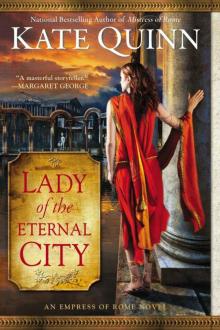 Lady of the Eternal City
Lady of the Eternal City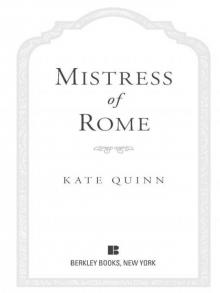 Mistress of Rome
Mistress of Rome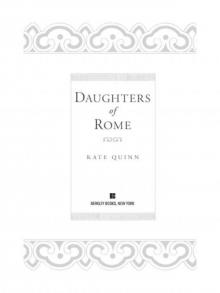 Daughters of Rome
Daughters of Rome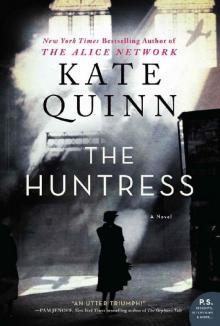 The Huntress
The Huntress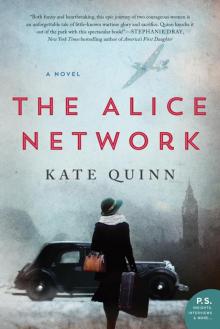 The Alice Network
The Alice Network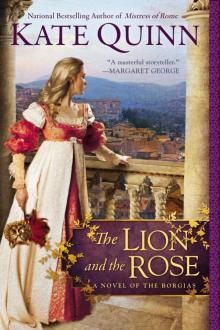 The Lion and the Rose
The Lion and the Rose Empress of the Seven Hills
Empress of the Seven Hills The Serpent and the Pearl
The Serpent and the Pearl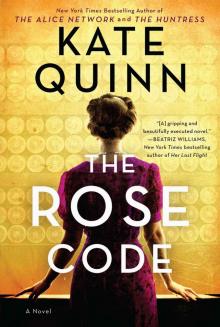 The Rose Code
The Rose Code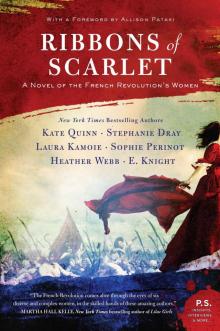 Ribbons of Scarlet
Ribbons of Scarlet A Song of War: a novel of Troy
A Song of War: a novel of Troy